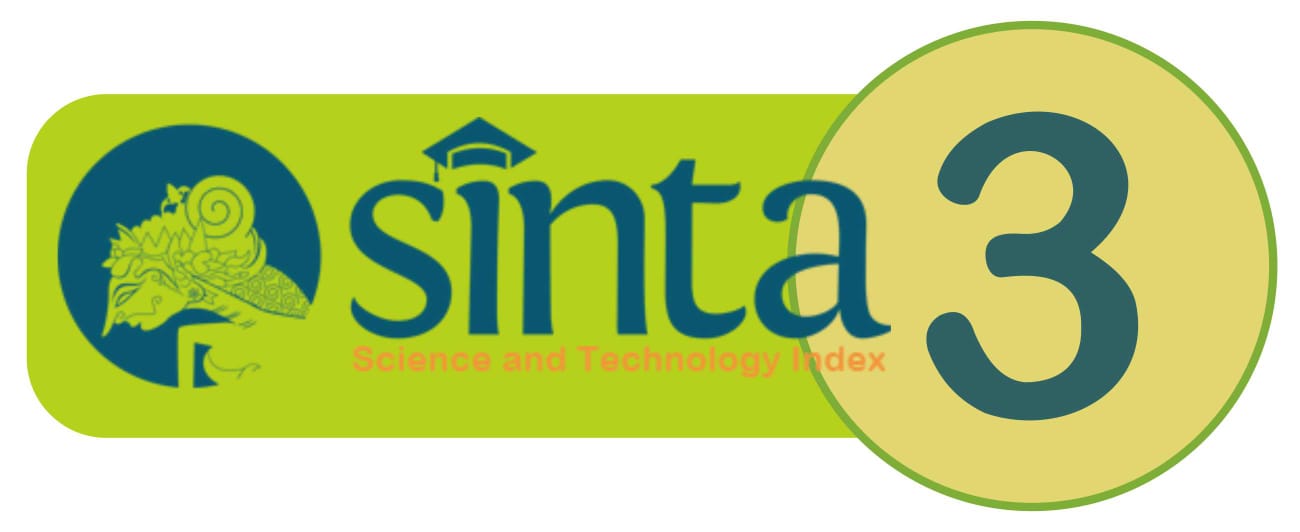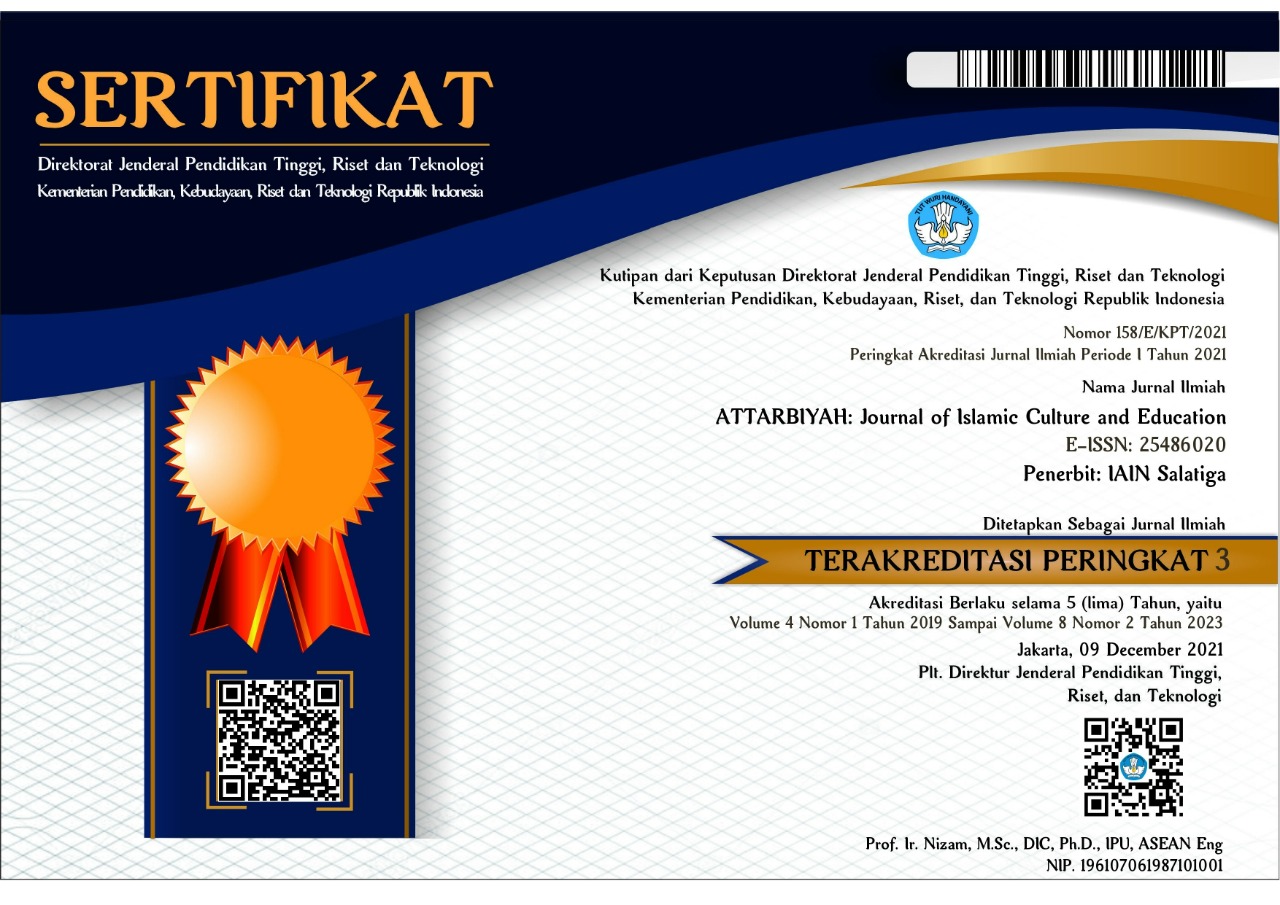Prodistik; madrasah management to develop IT skill in industrial revolution 4.0 era
Abstract
Huberman technique, which allows data reduction, data display, and data verification/conclusion. The study results indicate that Madrasah management in implementing Prodistik is collaborating with ITS Surabaya, forming an IT Skills Vocational Team and ToT, developing the Prodistik curriculum, and monitoring and evaluating programs in collaboration with ITS every semester. The conclusion is the increasing ability of MA Negeri 2 Probolinggo students in the IT field who are able to make various useful products by utilizing IT in the preparation of Final Projects and achievements in various IT competitions The implication is that educational institutions can realize Madrasah programs to the maximum if there is cooperation with other relevant institutions or institutions.
Keywords
Full Text:
PDFReferences
Alfan Makmur, M. (2020). Madrasah Vokasi Bidang IT Menyongsong revolusi industi 4.0 menuju Madrasah Hebat dan Bermartabat di MAN 2 Kota probolinggo. Pegagogy, 07(01), 6–10.
Anicic, K. P., & Buselic, V. (2021). Importance of Generic Skills of ICT Graduates - Employers, Teaching Staff, and Students Perspective. IEEE Transactions on Education, 64(3), 245–252. https://doi.org/10.1109/TE.2020.3034958
Cropley, A. (2020). Creativity-focused Technology Education in the Age of Industry 4.0. Creativity Research Journal, 00(00), 1–8. https://doi.org/10.1080/10400419.2020.1751546.
Dakir, Sholihin, M. W., & Faisol, M. (2021). Learning Effectiveness Improvement Through Mobile Learning. Turkish Online Journal of Qualitative Inquiry, 12(4), 1661–1665.
Eskak, E. (2020). Study of The Information and Communication Technology (ICT) Utilization to Improve The Competitiveness of Creative Crafts And Batik Industries in The 4.0 Industry Era. Prosiding Seminar Nasional Industri Kerajinan Dan Batik, 1–13.
Hadi, S. (2001). Observasi. In Metodologi Research II (p. 136). Fak. Psikologi UGM.
Hardani. Ustiawaty, J. A. H. (2017). Buku Metode Penelitian Kualitatif dan Kuantitatif (Cetakan I, Issue April). Pustaka Ilmu.
Hidayat, W., Muladi, M., & Mizar, M. (2016). Studi Integrasi TIK Dalam Pembelajaran Di Sekolah Menengah Kejuruan. Jurnal Pendidikan - Teori, Penelitian, Dan Pengembangan, 1(12), 2281–2291.
Jabbar, K. A. (2020). Manajemen Hubungan Lembaga Pendidikan Islam Dengan Dunia Usaha Dan Industri (Dudi). Tsaqafatuna, 2(1), 28–43. https://doi.org/10.54213/tsaqafatuna.v2i1.38.
Kusmawati, H., & Surachman, A. I. (2019). Glokalisasi Kurikulum Pendidikan Agama Islam Madrasah Aliyah Keagamaan Di Era Revolusi Industri 4.0. Jurnal Ilmiah Pendidikan Dasar, 6(2), 98. https://doi.org/10.30659/pendas.6.2.98-115.
Mahande, R. D., Darmawan, F. A., & Malago, J. D. (2021). Metacognitive skill assessment model through the blended learning management system in vocational education. Jurnal Pendidikan Vokasi, 11(1), 1–13. https://doi.org/10.21831/jpv.v11i1.36912.
Mahmud, E., Hefniy, Syakroni, A., Muali, C., Widad, R., Azizah, N., Zuhriya, S. A., & Abdullah, D. (2021). The Effect of Using Edmodo Application on Students' Mastery Skill of Technology. Journal of Physics: Conference Series, 1899(1). https://doi.org/10.1088/1742-6596/1899/1/012157.
Makmur, A. M. (2022a). MONEV PRODISTIK. In Wawancara Kepala MA Negeri 2 Probolinggo (p. 8).
Makmur, A. M. (2022b). MoU PRODISTIK. In Wawancara Kepala MA Negeri 2 Probolinggo (p. 2).
Meyana, Y. E., Ulfatin, N., & Sultoni. (2017). Kerjasama Lembaga Pendidikan dan Pelatihan dengan Lembaga Lain Bidang Kejuruan. Jurnal Pendidikan: Teori, Penelitian, Dan Pengembangan, 2(1), 157–165.
Miles, M. B., Huberman, A. M., & Saldana, J. (2013). Qualitative Data Analysis: A Methods Sourcebook, 3/E (third). SAGE Publications.
Moleong, L. J. (2000). Penelitian Kualitatif. In Metodologi Penelitian Kualitatif (p. 3). PT. Remaja Rosda Karya.
Moleong, L. J. (2013). Penelitian Studi Kasus. In Metodologi Penelitian Kualitatif (Edisi Revi,p. 26). PT. Remaja Rosda Karya.
Mulyana, Y. (2020). Peran Sumber Daya Manusia (SDM)/Generasi Muda Dalam Menyongsing Revolusi Industri 4.0. Prismakom, 16(1), 36–46.
Puji, L. (2017). Implementasi Sistem Informasi Manajemen Sekolah Dalam Meningkatkan Mutu Layanan Pendidikan Di Smk Negeri Karangpucung Kabupaten Cilacap. Jurnal Ilmiah Mahasiswa Pascasarjana Administrasi Pendidikan, 5(1), 1–8.
Puriwat, W., & Tripopsakul, S. (2020). Preparing for industry 4.0-will youths have enough essential skills?: An evidence from Thailand. International Journal of Instruction, 13(3), 89–104. https://doi.org/10.29333/iji.2020.1337a.
Rahmatullah, K. (2022a). Pengembangan Kurikulum. In Wawancara Kepala Tim Vokasi Keterampilan IT (p. 5).
Rahmatullah, K. (2022b). Tim Vokasi Keterampilan IT. In Wawancara Kepala Tim Vokasi Keterampilan IT (p. 6).
Ramdlani, M., Najah, F., Azizah, N., Niswa, H., Abdillah, M., & Rozi, F. (2021). Distance Learning and Independent Learning of Students in Higher Education. Journal of Physics: Conference Series, 1899(1), 1–6. https://doi.org/10.1088/1742 6596/1899/1/012177.
Rohida, L. (2018). Pengaruh Era Revolusi Industri 4.0 terhadap Kompetensi Sumber Daya Manusia. Jurnal Manajemen Dan Bisnis Indonesia, 6(1), 114–136. https://doi.org/10.31843/jmbi.v6i1.187.
Roma, M. (2021). Redefining Assessment in Tourism and Hospitality Education. International Journal of Higher Education, 10(4), 113. https://doi.org/10.5430/ijhe.v10n4p113.
Safitri, N. (2022). Pilihan Materi. In Wawancara Siswi MA Negeri 2 Probolinggo (p. 6).
Sulistiyono, J. (2020). Model Manajemen Pelatihan Tik “Dfh (Daring From Home)” Guru SMA Negeri di Kota Semarang. Didaktikum, 20(2), 1–9.
Syamsuar, & Reflianto. (2018). Pendidikan dan Tantangan Pembelajaran Berbasis Teknologi Informasi di Era Revolusi Industri 4.0. Jurnal Ilmiah Teknologi Pendidikan, 6(2), 1–13.
Ulinuha, H. (2022a). Tugas Akhir. In Wawancara Tim Vokasi Keterampilan IT (p. 7).
Ulinuha, H. (2022b). Tujuan Pilihan Materi. In Wawancara Tim Vokasi Keterampilan IT (p.7).
Wahid, A. H., Hidayati, W., & Bon, A. T. (2021). Information Technology in the Development of Language Aspects of Early Childhood. Proceedings of the 11th Annual International Conference on Industrial Engineering and Operations Management, 1–7.
Winda, R., & Dafit, F. (2021). Analisis Kesulitan Guru dalam Penggunaan Media Pembelajaran Online di Sekolah Dasar. Jurnal Pedagogi Dan Pembelajaran, 4(2), 211. https://doi.org/10.23887/jp2.v4i2.38941
Zamroni, Rofiki, M., Rozi, F., Muali, C., K, I. H., Majid, T., Abdullah, D., Hasan, K., Nasrah, S., Rahman, M., & Ita, C. (2021). E-Leadership in Education in Improving Teacher Competence in Industrial Revolution 4 . 0. Turkish Online Journal of Qualitative Inquiry (TOJQI), 12(4), 1650–1654.
Zubaidi, A. (2020). Supervisi, Monitoring, dan Evaluasi Pendidikan dalam PeningkatanMutu Lembaga Formal dan Non-Formal di Pondok Pesantren Nurul Jadid Paiton Probolinggo. GUYUB: Journal of Community Engagement, 1(2), 143– 156.https://doi.org/10.33650/guyub.v1i2.1511
Zubair, A. (2017). Manajemen Peningkatan Kinerja Guru. Jurnal Manager Pendidikan, 11(4), 305.
DOI: https://doi.org/10.18326/attarbiyah.v7i1.31-43
Refbacks
- There are currently no refbacks.

ATTARBIYAH: Journal of Islamic Culture and Education by http://attarbiyah.iainsalatiga.ac.id/ is licensed under a Creative Commons Attribution-ShareAlike 4.0 International License
----------------------------------------------------------
ATTARBIYAH : Journal of Islamic Culture and Education IAIN SALATIGA p-ISSN: 0215-9996, e-ISSN: 2548-6020




